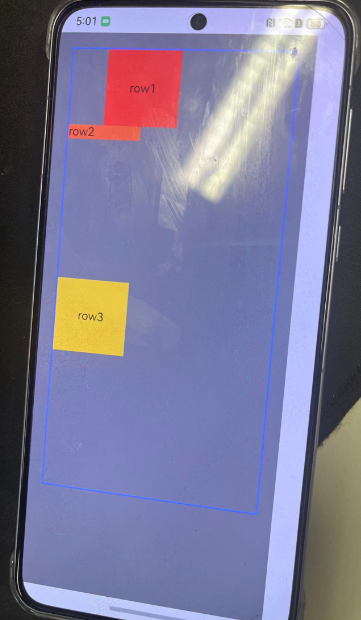HarmonyOS 鸿蒙Next 相对布局RelativeContainer怎么让子组件自适应高度
HarmonyOS 鸿蒙Next 相对布局RelativeContainer怎么让子组件自适应高度 问题描述:一个列Column包含三个组件ABC,RelativeContainer组件高度固定,上下AC组件高度固定,中间B组件动态适配高度。
代码如下:
@Entry
@Component
struct Index {
build() {
Column() {
/**
* 列:三个元素,上下固定高度,中间扩展自适应高度
*/
RelativeContainer() {
Row(){Text('row1')}.justifyContent(FlexAlign.Center)
.width(100).height(100)
.backgroundColor("#FF3333")
.alignRules({
top: {anchor: "__container__", align: VerticalAlign.Top},
right: {anchor: "__container__", align: HorizontalAlign.Center}
})
.id("row1")
//让Row2自适应高度
Row(){
Text('row2')
// .layoutWeight(1)
}.justifyContent(FlexAlign.Center)
.width(100)
.backgroundColor("#FF6633")
.layoutWeight(1)
.alignRules({
top: {anchor: "row1", align: VerticalAlign.Bottom}
})
.id("row2")
Row(){Text('row3')}.justifyContent(FlexAlign.Center)
.width(100).height(100)
.backgroundColor("#FFCC00")
.alignRules({
top: {anchor: "row2", align: VerticalAlign.Bottom},
bottom: {anchor: "__container__", align: VerticalAlign.Bottom}
})
.id("row3")
}
.width(300)
.height(600)
.margin(20)
.border({width:2, color: "#6699FF"})
}
.height('100%')
.backgroundColor(Color.Grey)
}
}
效果如下:

问题:如何让row2适配剩余高度,row3在底部??
回答问题的朋友有条件的话,最好先自测下,看看效果哈😊
更多关于HarmonyOS 鸿蒙Next 相对布局RelativeContainer怎么让子组件自适应高度的实战教程也可以访问 https://www.itying.com/category-93-b0.html
正确示例:RelativeContainer放在`Column`组件里面!!! 不固定宽高的组件依赖固定宽高的,不要依赖不确定宽高的组件!!!
```javascript
[@Entry](/user/Entry)
[@Component](/user/Component)
struct Index {
build() {
Column() {
/**
* 列:三个元素,上下固定高度,中间扩展自适应高度
*/
RelativeContainer() {
Row() {
Text('row1')
}
.justifyContent(FlexAlign.Center)
.width(100)
.height(100)
.backgroundColor("#FF3333")
.alignRules({
right: { anchor: "__container__", align: HorizontalAlign.Center },
top: { anchor: "__container__", align: VerticalAlign.Top },
/**
* 不要依赖不确定宽高的组件!!! 如row2高度不确定
*/
// bottom: {anchor: "row2", align: VerticalAlign.Bottom}
})
.id("row1")
//让Row2自适应高度
Row() {
Text('row2')
}
.justifyContent(FlexAlign.Center)
.width(100)
.backgroundColor("#FF6633")
.alignRules({
/**
* 不固定宽高的组件依赖固定宽高的,不要依赖不确定宽高的组件!!!
*/
top: { anchor: "row1", align: VerticalAlign.Bottom },
bottom: { anchor: "row3", align: VerticalAlign.Top }
})
.id("row2")
Row() {
Text('row3')
}
.justifyContent(FlexAlign.Center)
.width(100)
.height(100)
.backgroundColor("#FFCC00")
.alignRules({
/**
* 不要依赖不确定宽高的组件!!! 如row2高度不确定
*/
// top: {anchor: "row2", align: VerticalAlign.Bottom},
bottom: { anchor: "__container__", align: VerticalAlign.Bottom }
})
.id("row3")
}
.width(300)
.height(600)
.margin(20)
.border({ width: 2, color: "#6699FF" })
}
.height('100%')
.backgroundColor(Color.Grey)
}
}
更多关于HarmonyOS 鸿蒙Next 相对布局RelativeContainer怎么让子组件自适应高度的实战系列教程也可以访问 https://www.itying.com/category-93-b0.html
参考文档:https://developer.huawei.com/consumer/cn/doc/harmonyos-guides-V5/adaptive-layout-V5
仅当父容器是Row、Column或者Flex时,layoutWeight属性才会生效,所以你这边不生效
@Entry
@Component
struct Test {
build() {
RelativeContainer() {
Column() {
/**
* 列:三个元素,上下固定高度,中间扩展自适应高度
*/
Row() {
Text('row1')
}
.justifyContent(FlexAlign.Center)
.width(100)
.height(100)
.backgroundColor("#FF3333")
.alignRules({
top: { anchor: "__container__", align: VerticalAlign.Top },
right: { anchor: "__container__", align: HorizontalAlign.Center },
// bottom: {anchor: "row2", align: VerticalAlign.Bottom}
})
.id("row1")
//让Row2自适应高度
Row() {
Text('row2')
// .layoutWeight(1)
}
.justifyContent(FlexAlign.Center)
.width(100)
.backgroundColor("#FF6633")
.layoutWeight(1)
.alignRules({
top: { anchor: "row1", align: VerticalAlign.Bottom },
// bottom: {anchor: "row3", align: VerticalAlign.Top}
})
.id("row2")
Row() {
Text('row3')
}
.justifyContent(FlexAlign.Center)
.width(100)
.height(100)
.backgroundColor("#FFCC00")
.alignRules({
top: { anchor: "row2", align: VerticalAlign.Bottom },
bottom: { anchor: "__container__", align: VerticalAlign.Bottom }
})
.id("row3")
}
.width(300)
.height(600)
.margin(20)
.border({ width: 2, color: "#6699FF" })
}
.height('100%')
.backgroundColor(Color.Grey)
}
}
我试了下,把相对布局RelativeContainer和alignRules去掉,row2仍是可以动态扩展的,这是利用的layoutWeight权重实现的。单纯利用RelativeContainer能达到这个效果吗?
这种当前好像不行吧,你这种场景只能通过动态计算的方式去计算出row2的高度手动赋值了,
不知道,感觉和iOS和安卓的相对布局还不一样,iOS的相对布局时可以达到这个效果的。
在HarmonyOS鸿蒙系统中,使用RelativeContainer实现子组件自适应高度,可以通过设置子组件的布局参数来实现。具体步骤如下:
-
设置子组件的高度为自适应:在XML布局文件中,为需要自适应高度的子组件设置
height属性为match_parent。但需要注意的是,在RelativeContainer中,直接使用match_parent可能不会达到预期效果,因为RelativeContainer的子组件通常是根据其他组件的位置或父容器的边界来定位的。 -
使用布局约束:利用RelativeContainer的布局约束功能,通过
left_of、right_of、top_of、bottom_of、align_parent_top、align_parent_bottom等属性来定义子组件的位置。当子组件的上下边界被正确约束时,其高度会根据这些约束自适应调整。 -
避免固定高度:确保不要为子组件设置固定的
height值,这样它们才能根据父容器或其他子组件的位置动态调整高度。 -
代码动态设置:如果需要在代码中动态设置子组件的高度,可以通过获取父容器或相关子组件的布局参数,并据此调整目标子组件的高度。
如果以上方法仍然无法解决您的问题,可能是布局逻辑或组件属性设置上有特殊需求。此时,请直接联系官网客服以获取更专业的帮助。官网地址是:https://www.itying.com/category-93-b0.html






